| Srl | Item |
| 1 |
ID:
161154
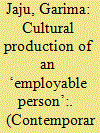

|
|
|
|
|
| Summary/Abstract |
Madrasas are increasingly being reformed across South Asia with the intended aim of ‘social change’ through mainstreaming its marginalized Muslim population. While the transformative change, as promised in policy and popular discourse, remains distant, a vernacular cultural variant of this ‘change’ is intimately felt in the changing subjectivities of the students. As future holders of degrees now recognized by the government, the students imagine themselves as ‘employable persons’. In so doing, they challenge their long drawn marginal position in the economy and society as ‘unemployable persons’. By separating ‘being employable’ from being employed, the students are social agents innovatively responding to the broader socio-cultural and political economy, to achieve an elevated status for themselves, despite their likely unemployment and continued socio-economic marginality. While the madrasa students fail in accessing social mobility, they reproduce their condition in an agentive manner – through contestation and ‘partial penetration’.
|
|
|
|
|
|
|
|
|
|
|
|
|
|
|
|
| 2 |
ID:
120070
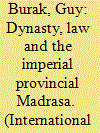

|
|
|
|
|
| Publication |
2013.
|
| Summary/Abstract |
This study looks at the history of two madrasas in Jerusalem, al-Madrasa al-?Uthmaniyya and al-Madrasa al-Fanariyya from the 15th to the 18th centuries, in order to examine an understudied Ottoman institution: the imperial provincial madrasa. The imperial madrasas were assigned to the state-appointed Hanafi muftis of different localities across the empire. This essay argues that these learning institutions helped to consolidate the connection between the Ottoman dynasty, its appointed jurisconsults, and its broader imperial learned hierarchy. Beyond revealing some of its important institutional aspects, examining the imperial provincial madrasa casts light on the doctrinal role the Ottoman dynasty assumed in regulating the content of Hanafi jurisprudence that members of the imperial learned hierarchy were to apply. This role and the connections between the dynasty and its appointed jurisconsults had important effects within the diverse legal landscape of the empire, where multiple Sunni (especially Hanafi) legal and scholarly traditions coexisted. In further analyzing the identity of the endowers of these imperial madrasas, the article opens up new avenues for exploring how the Ottoman dynasty was defined in different contexts.
|
|
|
|
|
|
|
|
|
|
|
|
|
|
|
|
| 3 |
ID:
132963
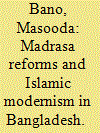

|
|
|
|
|
| Publication |
2014.
|
| Summary/Abstract |
The old project of modernizing madrasas has acquired a new zeal in South Asia after September 2011, whereby madrasa reform programmes became an acknowledged soft tactic of the war on terror. With 9000 Aliya (reformed) madrasas, the Bangladesh madrasa modernization programme has been identified as a potentially useful model for the neighbouring states of Pakistan and India who have made slower progress in implementing similar programmes. In this paper I argue that, although the Aliya madrasa system in Bangladesh has succeeded in integrating secular subjects in the madrasa curriculum, in reality this modernization project has failed in its underlying ambition to generate a 'modern discourse' on Islam-a discourse that is compatible with the demands of western modernity. The right to speak for Islam is still primarily exercised by the 'ulama and graduates of the Qoumi (unreformed) madrasas. Aliya madrasas today compete with the secular schools not with Qoumi madrasas. The growth of the Aliya madrasa system in Bangladesh, instead of bearing testimony to the popular appeal of the modernization agenda, demonstrates the preference of Muslim parents for increased Islamic content in the school curriculum
|
|
|
|
|
|
|
|
|
|
|
|
|
|
|
|
| 4 |
ID:
140473
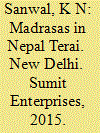

|
|
|
|
|
| Publication |
New Delhi, Sumit Enterprises, 2015.
|
| Description |
viii, 240p.hbk
|
| Standard Number |
9788184204902
|
|
|
|
|
|
|
|
|
|
|
|
Copies: C:1/I:0,R:0,Q:0
Circulation
| Accession# | Call# | Current Location | Status | Policy | Location |
| 058276 | 297.775496/SAN 058276 | Main | On Shelf | General | |
|
|
|
|
| 5 |
ID:
108481
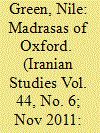

|
|
|
| 6 |
ID:
073627
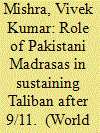

|
|
|
| 7 |
ID:
103689
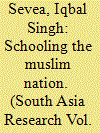

|
|
|
|
|
| Publication |
2011.
|
| Summary/Abstract |
This article examines Muhammad Iqbal's critique of contemporary approaches towards Muslim education. In his writings, poetic and prose, Iqbal took on both the traditional religious authorities who administered the Madrasas and the modernists associated with the Aligarh College for failing to provide an education that was true to the 'national character' and to develop a synthesis of Islamic and western knowledge. While the former were criticised for ignoring modern intellectual developments, the latter were attacked for being intellectually captive to the West. At a broader level, this article employs Iqbal as a foil to debates over the empowering potential of western education. Iqbal's views are examined against the background of attempts by Muslim intel-lectuals to negotiate between the adoption of a universal modern education and the development of an educational system that kept Muslims grounded in Islam and their 'national character'. These negotiations took on a number of shapes, pedagogical and polemical as well as theological.
|
|
|
|
|
|
|
|
|
|
|
|
|
|
|
|